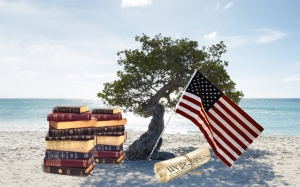“If you were stranded on a desert island, which three people would you want with you?” We have all been asked that question, or one like it, at some point in our lives. Far too many people give terrifyingly egocentric answers.
Kim Jong-un, Donald Trump . . . I don’t know, Charles Manson. Those are logical answers with potentially global consequences for the common good. On the other hand, a best friend, loved one, spouse, child, or celebrity. Answers like those beg the question, “You do understand that you are sentencing these people to a slow death by dehydration or starvation, right?”
Of course, it is all a matter of perspective. “What if?” exercises like these demonstrate how forcefully a person’s ego can assert itself on a theoretical environment. A self-centered respondent will inevitably provide self-satisfying answers that would be horrifying if realized in real life, while an optimist would be more prone to envision a “desert island” as a picturesque Gilligan’s Island rather than the desolate patch of sand without ready food, shelter, or potable water that a pessimist would expect.
Optimism versus Pragmatism
The optimist expects the best of any theoretical scenario. Asked what they would do with six months left to live, the optimist isn’t going to plan a bucket list around the medical condition that is killing him. The optimist will climb a mountain assuming that health won’t be an issue, unworried about their access to the prescription drugs and medical facilities that a dying person tends to favor. It’s a theoretical scenario, which means an opportunity to explore boundless hope and joyful abstractions. A desert island seems more like a weekend retreat for people whose perception of fantasy is disconnected from real world considerations.
The pragmatist is drawing up a will and meticulously planning out his last six months in a fantasy scenario bound in anchor chain to real world considerations. It’s not quite pessimism, but having to pick three people to be stranded on a desert island with is pragmatically equivalent to being asked who you’d want piling on top if you had to jump on a grenade. There’s no dental care on that island. Survivor’s accounts are rife with despair and madness. Who would you wish that on?
These characteristics define two very different types of readers and media consumers. Understanding their needs helps an author to plot out how much suspension of disbelief they must sustain.
Altruism versus Egocentricity

An optimist and pragmatist may both agree in answering that they would bring a survival expert, doctor, and shipwright, but such an answer still suggests a strong degree of egocentricity. What the respondents are really asking for are caregivers and providers, a sort of hazily-defined island welfare system dedicated explicitly to their own support and well-being. It would be a singular person who suggests, “I’d want to be stranded with a survival expert who will go off on his own and leave me to die, a doctor whose own survival skills will be sub-par to my own but who will nonetheless expect me to demur to his authority on account of his social standing, and then a shipwright who will have a far easier time crafting a boat for himself, although he will promise to send someone looking for us as soon as he finds help.” Egocentric people don’t walk away from such questions thinking how useless they would be outside of their specialized environment.
A novel is often an exercise in stranding people on literal or figurative desert islands. Understanding the interplay between altruism and egocentricity gives character depth but also allows authors to identify the biases in the own worldview. It helps authors to avoid writing “protagonists” who are actually complete assholes, like Jack Shepherd in “Lost.”
Sycophancy

The sycophant is best exemplified by the alternate version of the desert island question, “What three things do you bring?” Well, the Bible, the American Constitution, and a spare Bible, obviously. Not because the sycophant really spends much time reading either of those documents, nor because of their pertinence to the scenario, but because it’s the “right” answer, the crowd-pleaser for their immediate group. Whereas others find an opportunity to satisfy their own internal sense of wonder and curiosity, the sycophant uses theoretical quandaries as another method of fitting in without any actual sense of self-expression. Someone like that would write great copy for Bill O’Reilly but isn’t quite cut out for fiction.